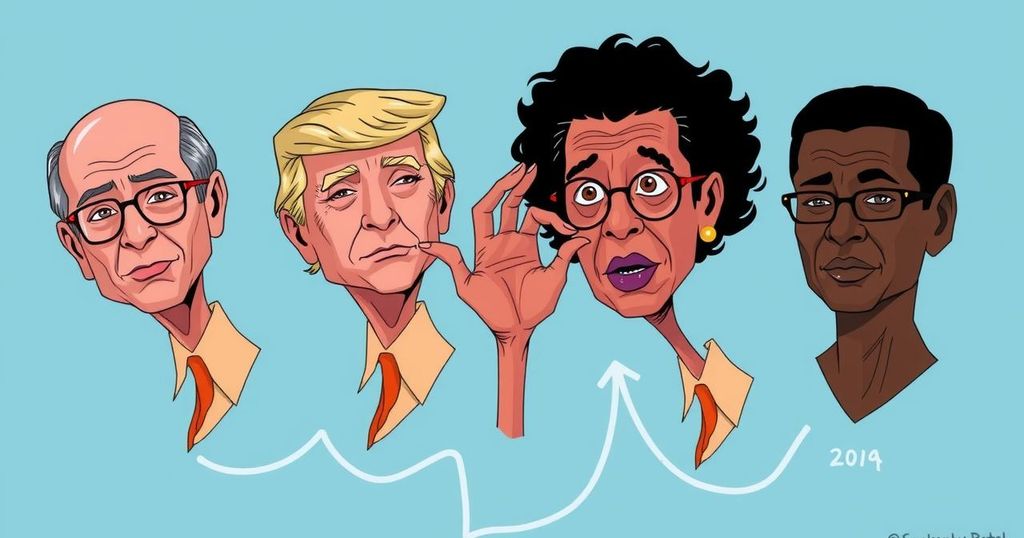2024: Voters Worldwide Declared ‘You’re Fired’ to Incumbents

In 2024, global voters expressed their discontent with incumbents across around 70 nations, resulting in significant political upheaval. Economic turmoil and social disaffection post-COVID-19 drove electorates towards alternative candidates, leading to substantial electoral losses for long-standing parties. Amidst rising populism and concerns over foreign influence, the year revealed a demand for reform, indicating a fragile state for democracy as challenges persist into 2025.
In 2024, voters across approximately 70 nations, encompassing half the global population, demanded significant change, often delivering an unmistakable verdict: “You’re fired.” Discontent with economic turmoil, social inequality, and geopolitical instability led to the ousting of incumbents in various countries, ranging from India and the United States to Japan and France. In many instances, electorates shifted towards unconventional candidates, reflecting an escalating dissatisfaction with the status quo.
The year 2024 marked a turbulent period in the global democratic landscape, underscored by widespread demonstrations in nations such as Mozambique and Georgia, the annulment of an election in Romania, and attempts at imposing martial law in South Korea. Cas Mudde, a professor of international affairs, remarked on this year as “a great year for the far right, a terrible year for incumbents, and a troublesome year for democracy around the world.”
A prominent factor for this anti-incumbent sentiment, as noted by University of Manchester political scientist Rob Ford, stems from the residual impacts of the COVID-19 pandemic. Many citizens remain disillusioned due to ongoing health, economic, and social disruptions, coupled with rampant inflation exacerbated by geopolitical conflicts, particularly Russia’s invasion of Ukraine.
Consequentially, some notable political transformations occurred. In South Africa, the long-standing African National Congress, which held power since the end of apartheid, suffered significant losses and was compelled to form a coalition government. Similarly, the ruling parties in Senegal, Ghana, and Botswana faced defeat, while in India, Prime Minister Narendra Modi’s Bharatiya Janata Party lost its majority for the first time in a decade.
On the other hand, in Japan, Prime Minister Shigeru Ishiba’s Liberal Democratic Party suffered a substantial setback, leading to a minority government. The United Kingdom also saw a significant political shift, with the center-left Labour Party emerging victorious after 14 years of Conservative rule. However, the elections illustrated a fragmentation of power, as smaller parties garnered increasing support.
In Europe, conservative populists and far-right entities gained ground in multiple elections, challenging established parties. The rise of the National Rally party in France and the Freedom Party in Austria highlighted this trend, although strategic voting in France prevented the former from maintaining its standing.
The impact of political dynasties persisted in countries such as Pakistan and Indonesia, where political legacies continued to influence recent elections. Conversely, long-standing leaders faced striking reversals as seen in Bangladesh and Sri Lanka, where voter dissatisfaction culminated in significant shifts in power.
Concerns regarding foreign interference and misinformation campaigns grew in prominence this year. Meta, the parent entity of Facebook, reported dismantling numerous covert influence operations, particularly from Russia, Iran, and China, which sought to skew electoral outcomes globally.
Amid joyous political milestones, there were also troubling developments, such as Donald Trump’s unexpected return to the U.S. presidency, marking a renewed concern for both allies and adversaries alike. Instances of political unrest persisted worldwide, including post-election turmoil in Venezuela and violent protests in Mozambique, highlighting significant challenges to established political structures.
As 2024 concluded, the global democratic landscape appeared precarious, with many incumbents facing mounting opposition. Looking forward to 2025, expert assessments imply ongoing struggles for democracy, even as support for its ideals remains ostensibly strong amid disillusionment. Seema Shah from the International Institute for Democracy noted that while the theoretical appeal of democracy endures, the practical manifestations often fall short of public expectations.
The voter sentiment in 2024 clearly indicates a profound desire for reform across various nations, exemplifying a collective fatigue with entrenched political entities and a call for accountable governance.
The political climate of 2024 was characterized by significant unrest and voter dissatisfaction globally, leading to the widespread dismissal of incumbent leaders. Economic instability, social inequality, and the lingering effects of the COVID-19 pandemic catalyzed a shift in public sentiment, resulting in a demand for change. Countries that participated in elections experienced varied outcomes, with an increase in new, often more extreme candidates, reflecting the desire for alternatives to traditional political systems. Experts analyzed these trends, underscoring a global shift toward populism and reflecting on the implications for democracy as a whole.
The events of 2024 signify a pivotal moment for global democracy, marked by widespread anti-incumbent sentiment and a notable rise in support for alternative political options. The impacts of the COVID-19 pandemic, combined with economic challenges and social issues, have created a fertile ground for political upheaval. As nations navigate these challenges, the call for meaningful reform remains urgent, revealing a populace eager for governance that meets their expectations. The ongoing political landscape appears tumultuous, suggesting that subsequent years will continue to shape the future of democracy around the world.
Original Source: www.pbs.org







